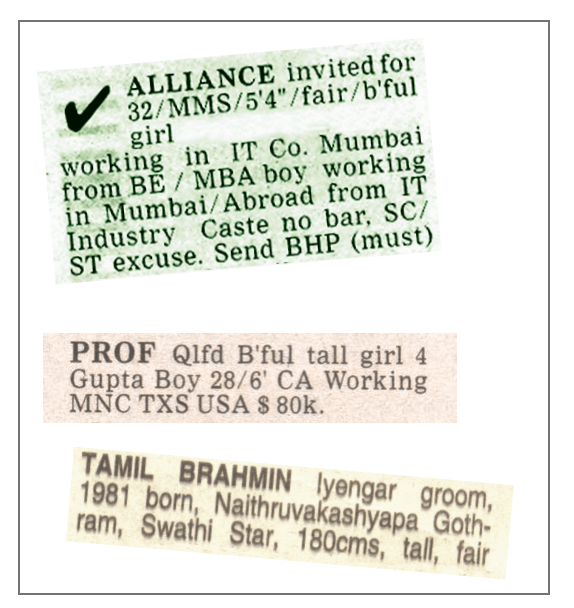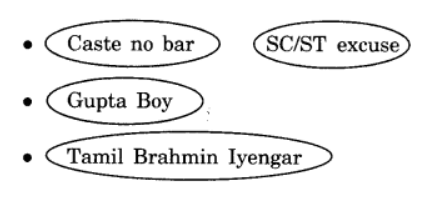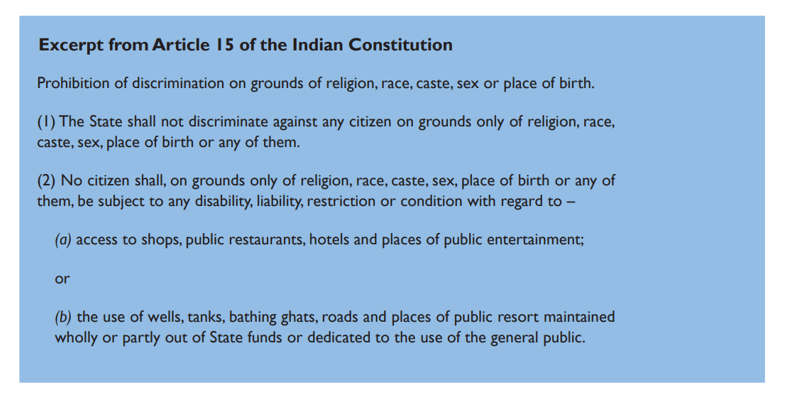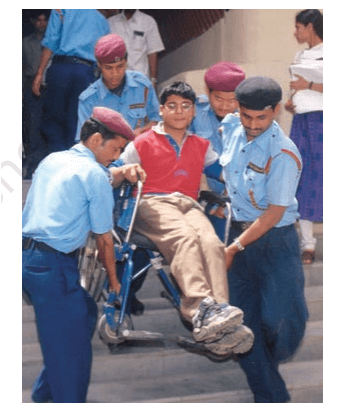Civics - Class 7
Social and Political Life II
Chapter 1: On Equality
Intext Questions:
Question 1 :Do you think Kanta has enough reason to doubt whether she really is equal? List three reasons from the story that might make her feel like this.
Answer:Yes, Kanta has enough reasons to
doubt whether she is really equal.
Reasons:
- She cannot skip work even when her daughter is ill.
- She does not have enough money to take her daughter to the doctor.
- She has to stand in line at a government hospital for her turn to show her daughter to the doctor.
Question 2 :Circle the reference to caste in the matrimonial advertisements given below:

Answer:

Question 3 :Why do you think Omprakash Valmiki was being treated unequally by his teacher and his classmates? Imagine yourself as Omprakash Valmiki and write four lines about how you would feel if you were in the same situation as him.
Answer:Yes, Omprakash Valmiki was being
treated unequally by his teacher and his classmates because he was Dalit. We, as
Omprakash Valmiki would feel humiliated and many questions would arise in our minds.
Like:
Do we not have soul, heart?
Are we not fit for education?
Why are we treated unequally?
Question 4 :Why do you think the Ansaris were being treated unequally? What would you do if you were in the Ansaris’ position and could not find a place to live because some people did not want to live next to you because of the religion you practice?
Answer:Ansaris were being treated unequally
because they belonged to the Muslim religion.
If we were in Ansaris’ position,
We would go to the Minority Commission to lodge a complaint against the apartment
owners.
We would try to reason out with people.
Question 5 :If you were one of the Ansaris’ how would you have responded to the suggestion that you change your name?
Answer:I would have responded in these
words:
I will not change my name as there is nothing in the name, we all are God’s creation.
Question 6 :Can you think of an incident in your life in which your dignity was violated? How did this make you feel?
Answer:Yes. One day my grand mom scolds me for the mistake made by my sister in front of my relatives. It was disgusting and I felt very bad for this.
Question 7 :What is the midday meal programme? Can you list three benefits of the programme? How do you think this program might help promote greater equality?
Answer:In the midday meal programme students of primary classes are provided lunch in the schools all over the country.
Benefits:
Truancy after recess has decreased.
More and more children enrol themselves in the schools.
Would help poor students and improve their concentration.
Mothers do not have to leave their work in the mid.
This programme might help promote equality as it would reduce caste prejudices.
In some places, Dalit women are employed to cook meals for all children.
Question 8 :Find out about one government scheme in your area. What does this scheme do? Who is this scheme set up to benefit?
Answer:Sarva Shiksha Abhiyan (S.S.A.).
This scheme provides education to those children who do not join schools for one or the other reason.
This scheme is set to benefit Dalit children mostly.
Exercises:
Question 1 :In a democracy why is universal adult franchise important?
Answer:In a democracy, the universal adult franchise is important because it is based on the principle of equality.
It authorizes every adult citizen in a country to cast one vote irrespective of her/ his wealth and the communities she/he belongs to.
Question 2 :Re-read the box on Article 15 and state two ways in which this Article addresses inequality?

Answer:This Article addresses inequality in terms of
(a) Access to shops, public restaurants, hotels and places of public entertainment,
or
(b) The use of wells, tanks, bathing ghats, roads and places of public resort maintained wholly or partly out of state funds or dedicated to the use of the general public.
Question 3 :In what ways was Omprakash Valmikis’ experience similar to that of the Ansaris’?
Answer:Omprakash Valmiki’s experience was
similar to that of Ansaris in the following ways:
Omprakash Valmiki was not allowed
to sit with other students on the desks or mats.
Ansaris were not given apartments on rent in the locality of the people belonging to the
Hindu religion.
Omprakash Valmiki was discriminated against on the basis of caste while Ansaris were
discriminated against on the basis of religion.
Question 4 :What do you understand by the term “all persons are equal before the law”? Why do you think it is important in a democracy?
Answer:By the term, “all persons are equal
before the law”, we understand equality.
Equality is important in a democracy because democracy is the government of the people,
by the people and for the people.
Equality is the essence of democracy.
If people are discriminated against on the basis of caste, creed, religion, sex,
prosperity etc. the democracy will not survive.
Question 5 :The Government of India passed the
Disabilities Act in 1995. This law states that According to the Rights of Persons with
Disabilities Act, 2016, persons with disabilities have equal rights, and that the
government should make possible their full participation in society. The government has
to provide free education and integrate children with disabilities into mainstream
schools. This law also states that all public places including buildings, school etc.,
should be accessible and provided with ramps.
Look at the photograph and think about the boy who is being carried down the stairs. Do
you think the above law is being implemented in his case? What needs to be done to make
the building and accessible for him? How would his being carried down the stairs affect
his dignity as well as his safety?

Answer:The above law is not being
implemented in the case of the boy who is being carried down the stairs as shown in the
photograph.
There is a need to construct public buildings like schools, hospitals, etc., with the
provisions of ramps so that they may be more accessible for persons with
disabilities.
The dignity of the boy is affected by being carried down the stairs because he may feel
inferior for his dependency on others for movement in such places. His safety is also at
stake as the persons helping him may cause an accident.